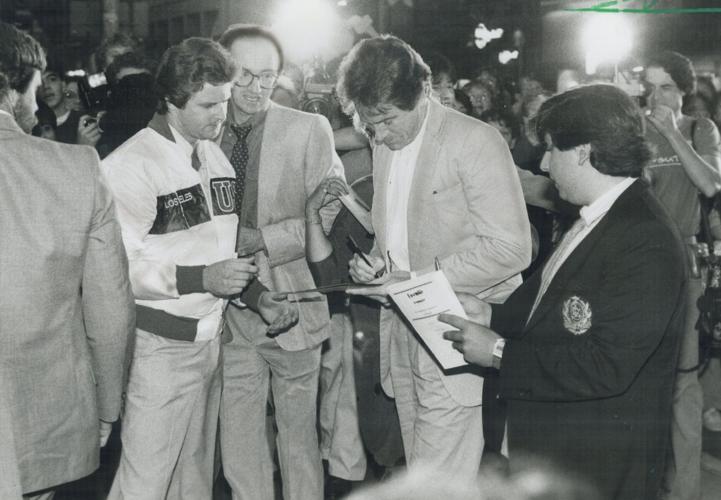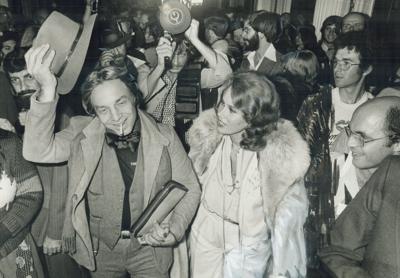Film is part of …´…´¿≤‚Äôs DNA: in 1979, a …´…´¿≤ Star editorial titled “Mad for Movies” noted that the city boasted the highest per capita rate of motion picture attendance of any major city in North America. Yet, until 1976, it lacked a world-class Ô¨Ålm festival. That changed when local businesspeople Bill Marshall, Dusty Cohl and Henk Van der Kolk launched the Festival of Festivals as a curated collection of cinema from other festivals. Headquartered in Yorkville‚Äôs Windsor Arms Hotel, the festival presented 129 films over seven days, opening with the French romantic comedy ‚ÄúCousin, Cousine‚Äù at the Ontario Place Cinesphere.
Ron Base (former …´…´¿≤ Star film critic) Dusty, Bill and Henk were three buccaneers: they didn‚Äôt play by the rules. They came up with crazy ideas like putting together a film festival! Dusty would go to the Cannes Film Festival every year, park himself on the terrace at the Carlton hotel and start buying drinks for everybody. There‚Äôd be 20 people sitting around Dusty. Invariably, somebody would lean over and say, ‚ÄúTell me, what is it that Dusty does?‚Äù And I would say, ‚ÄúYour guess is as good as mine.‚Äù All of that helped churn up interest in the festival.
Piers Handling (former TIFF director and chief executive officer) Bill, Dusty and Henk upended the festival model. Everything that was happening in Europe, they did the opposite. If there was a red carpet, there was gonna be no red carpet in …´…´¿≤. If there was a black tie, there was gonna be no black tie in …´…´¿≤. If there was a jury, there‚Äôs gonna be no jury. If there was a market, there was going to be no market.
This festival is about the public and I cannot emphasize that enough. So, when they started to get into prizes in 1978, the first prize was an audience award. (It went to Claudia Weill’s dramedy “Girlfriends.”)

Visionary film festival founders Henk Van der Kolk, Bill Marshall and Dusty Cohl in 1995.
Dick Loek/…´…´¿≤ Star file photoDavid Cronenberg (filmmaker) I don‚Äôt think …´…´¿≤ could have the reputation that it does for being global without a festival. I think it‚Äôs become de rigueur that an aspiring city must have a film festival to be taken seriously internationally.
Michèle Maheux (former TIFF executive director and chief operating officer) As a film studies student in 1978, I wrote a note to (film professor) Peter Harcourt saying, “Michèle will not be attending class as she has gone to the Festival of Festivals.” I ordered my pass through the mail, and it never arrived. So, I went to the box office in Yorkville, and they were like, “Oh yeah, no problem.” They just handed me another pass. Those were the days.
Wayne Clarkson (former festival director) I walked into planning the ’78 festival knowing next to nothing, and discovered we were required to submit all the films in advance to the Ontario Censor Board. This included that year’s opening night film, “In Praise of Older Women.”
Bill Marshall, Robert Lantos — the Montreal producer of the film — and I agreed we were not going to accept cuts. Lantos had two prints, so he brought both. One of the prints we submitted to the censor board in advance, and it cut out a two- or three-minute sex scene that had some nudity and bouncing up and down that mostly occurred under blankets. They gave us the film in three bins, one for each reel; there were bands put around the bins by the censor, declaring the film had been approved. We put them onto the uncut and unapproved version.
There was chaos on opening night. Everybody wanted to see the film and there weren’t enough seats, and it was pouring rain outside the Elgin Theatre. Lo and behold, a representative of the censor came in to check on the film. He goes up to the projection booth and of course we had the bins and reels there with the four strips that designated it had been approved by the censor. He didn’t stick around to see if what we showed was the version they had approved. Because it was opening night, and we had to turn away lots of people, I called Linda Beath, who was then running the Festival Theatre (now the CAA Theatre) on Yonge Street and asked her to screen the legal version so people who couldn’t get into the Elgin could see it. She said, “Sure.”
Base Back then, the festival was more indiscriminate when it came to opening night films. In 1980, it was “Loving Couples,” a romantic comedy that everybody has completely forgotten about. James Coburn was in it and so was Shirley MacLaine; David Susskind, a famous talk show host, was the producer. I was the Star’s newly minted movie critic. Susskind, an intriguing, charismatic individual, was in town with his wife, Joyce Davidson.
During our interview, Susskind looks at his watch and says, “Oh my gosh, we’re going to be late for the opening! Come on. We’ll drive you over there.” We go down to the big, long limo. Suddenly we’re driving up to the front of the University Theatre. There are mobs of people waiting for the stars, but Coburn and MacLaine weren’t there. You can hear the crowd start to murmur as the first of the limos of the night pulls up. Susskind says to me, “Go on, get out!”
I open the door and jump out and suddenly there’s this deathly silence as everybody realizes that there was no star here at all. It was the first time I would be reviewing a movie and here I was on the red carpet. The movie was terrible. Everybody panned it. Unfortunately, I was the first guy to pan it. I never heard from the Susskinds again.

Warren Beatty — one of the biggest stars in the world, known for “Shampoo” and “Heaven Can Wait” — arrives at the University Theatre in 1984 amid a throng of autograph seekers.
Jim Russell/…´…´¿≤ Star file photoGeorge Anthony (early board member and former …´…´¿≤ Sun film critic) The audience took to the festival right away. Then they told their friends. Probably 10 years into it, we realized that people were planning their vacations around it.
Bruce McDonald (filmmaker) My friend Peter Mettler was the first of us to get a film into the festival, in 1982. It was called “Scissere,” and we went around town spray-painting the name of the film on buildings. But as I was doing that, I was a bit jealous that his film got into the festival and mine, a short student film called “Let Me See,” didn’t. Neither did Atom Egoyan’s short film (“Open House”). So, Atom and I decided we would show our films outside the University Theatre on the sidewalk. We got these tuxedos from a thrift shop. We set up a screen on the sidewalk, plugged in our 16mm projector and started showing our films to people walking by. The cops came by at one point and were like, “We’re going for a long coffee break. When we get back, be gone.” The festival people came and gave us a handful of tickets to go see movies.
In 1983, the comedy “The Big Chill” opened the festival — and a lot of doors. It proved to Hollywood and film bosses everywhere how effective the festival could be in helping them market their films. The ensemble cast — including Glenn Close, Jeff Goldblum and William Hurt — showed up for the screening.
Helga Stephenson (former festival director)Ã˝It was one of those sweltering Septembers: when you see pictures of people going into the University Theatre, they‚Äôre in short shorts and Hawaiian shirts. The cast walked over from (Yorkville‚Äôs Bellair Caf√©) and into the theatre and sat down in front. The marketing executives all sat at the back chewing their nails. They knew it was good, but they weren‚Äôt sure how it was going to work with audiences. At the end of the screening, they went, ‚ÄúWe‚Äôve got a hit!‚Äù
Handling A key moment for the festival was the 1988 world premiere of David Cronenberg’s “Dead Ringers” (a psychological thriller about identical twin gynecologists, played by Jeremy Irons). I knew David extremely well, although his reputation was not what it is now. I thought his film was a masterpiece and we decided to open the festival with it. But it’s a transgressive film and maybe the most controversial opening I can remember because of the audience reaction to that film, especially from women: “The gynecological instruments freaked us out! How could you open with a film like this?”
I still maintain it was the breakthrough film for David: the Europeans started to really pay attention to David as more than a genre director around the time of “Dead Ringers.” I’m still incredibly proud that we took that risk.
Cronenberg The traditional thing, even with Cannes, is to have the opening film be a non-threatening crowd-pleaser. I appreciated that Piers and his people made a bold choice, and I think it set the tone for the festival. It was very heartwarming to be there with the opening night audience, with all the prestige that entailed. There were probably more men than women squirming because the women would have at least been exposed to gynecological instruments. I think there was a lot of squirming all around, but I knew that would happen — it’s an emotional and scary film. But it was a great screening. I’ve always enjoyed playing the role of the outsider.
Maheux Sophia Loren came to the festival in 1990 for Lina Wertmüller’s “Saturday, Sunday and Monday.” A woman named Dorina Furgiuele, who was working with me in the press office, spoke fluent Italian, so I put her on Sophia because she didn’t come with her own publicist. She also didn’t come with a hair and makeup person. She did everything herself. Dorina phones me at the end of the day and says, “Sophia would like to know if you’d like to join us in her suite for breakfast tomorrow morning.” And I said, “Oh, I will be there.” So, at like eight in the morning, I go up to her hotel suite. We sat there like three girls, having coffee and croissants together.
Chaz Ebert (CEO and publisher of ) I started going to the …´…´¿≤ festival (with late husband, film critic Roger Ebert) probably in 1990, so it’s been 35 years. One of the reasons it’s been so important to me is because it was the only film festival I’ve ever gone to where I was interacting with so many married couples. That may seem like an odd observation to make, but it showed that …´…´¿≤ had the ear of its patrons and its citizens, and people wanted it to do well.

Movie fans close in on Clint Eastwood in 1990.
Erin Combs/…´…´¿≤ Star file photoStephenson Just before the 1990 festival, I had been told my mother had three months to live. She was in St. Michael‚Äôs Hospital. We were across the street (from the theatre where ‚ÄúWhite Hunter Black Heart,‚Äù starring Clint Eastwood, was to be screened) with the folks at Warner Brothers. My mother adored Clint Eastwood. The people around Clint talked to him. After he did his little hello to everybody on stage, we all walked across the street and went to say hi to my mother. I was very grateful that they took the time to do it. There was no press, no social media, nothing to be gained. We had great relationships with people, and they went out of their way to do very kind things.
Read part 2:Ã˝How the city claimed its spotlight




























To join the conversation set a first and last name in your user profile.
Sign in or register for free to join the Conversation